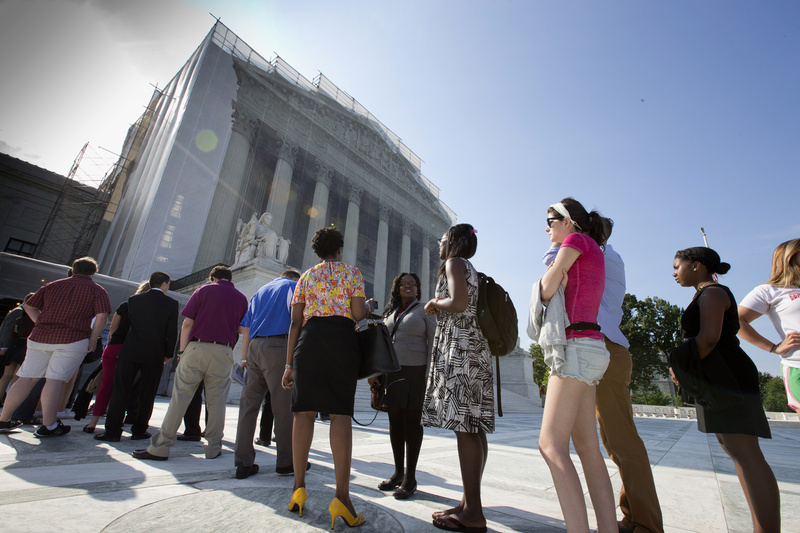WASHINGTON — In a free-speech ruling, the Supreme Court said Thursday that the government cannot force private health organizations to denounce prostitution as a condition of getting taxpayer money to fight AIDS around the world.
Chief Justice John Roberts, writing for the court, said the anti-prostitution pledge in a 2003 AIDS funding law improperly restricts the groups’ U.S. constitutional rights.
Four organizations that work in Africa, Asia and South America challenged the provision in the law, arguing their work has nothing to do with prostitution.
The Obama administration had countered that it is reasonable for the government to give money only to groups that oppose prostitution and sex trafficking because those activities contribute to the spread of HIV and AIDS. It said that if groups were not required to oppose prostitution and sex trafficking, they could spend private funds in a way that might undermine the government’s mission.
In the 6-2 decision, Roberts wrote that requiring the pledge “goes beyond preventing recipients from using private funds in a way that would undermine the federal government.”
“It requires them to pledge allegiance to the government’s policy of eradicating prostitution,” he wrote. That, the government cannot do, he wrote.
Justices Antonin Scalia and Clarence Thomas dissented. Scalia said the pledge “is nothing more than a means of selecting suitable agents to implement the government’s chosen strategy to eradicate HIV/AIDS.”
“That is perfectly permissible under the Constitution,” Scalia wrote.
The AIDS funding case was one of three decided Thursday. The court also:
• Sided, by a 5-3 vote, with American Express in ruling that merchants who object to having to accept the company’s debit and credit cards along with its iconic charge card cannot band together, but must resolve their disputes with the company one by one.
• Ruled 8-1 to limit judges’ discretion in deciding whether defendants should be sentenced under a federal law that increases prison terms for people who have been convicted of three serious crimes.
Eleven cases remain unresolved as the court heads into its final days before taking a summer break.
Among the outstanding cases are two involving gay marriage and two dealing with race – challenges to federal voting rights law and affirmative action in college admissions. The justices next meet on Monday to issue opinions.
In Thursday’s opinion, Roberts noted that Congress has made available billions of dollars for private groups to combat the spread of HIV and AIDS through the law, formally known as the United States Leadership Against HIV/AIDS, Tuberculosis and Malaria Act of 2003.
Another condition of funding that was not at issue in this case prohibits those groups from doing anything to promote the legalization of prostitution or sex trafficking.
A federal appeals court in New York had struck down the anti-prostitution pledge as an unacceptable intrusion on the groups’ right to speak freely. Another appeals court, in Washington, D.C., had upheld the provision against a similar challenge.
Two groups – Alliance for Open Society International Inc., which runs a program in Central Asia to prevent the spread of HIV and AIDS by reducing drug use, and Pathfinder International, which provides family planning and reproductive health services in more than 20 countries – went to the courts after they adopted policy statements opposing prostitution in order to keep their eligibility for funding intact.
The other two groups are Global Health Council and Interaction.
The organizations “fear that adopting a policy explicitly opposing prostitution may alienate certain host governments, and may diminish the effectiveness of some of their programs by making it more difficult to work with prostitutes in the fight against HIV/AIDS,” Roberts said.
Marine Buissonniere, director of Open Society’s public health program, said other organizations refused American money rather than sign the pledge.
“The recipients of federal AIDS funding can now operate without having to embrace the ideological views of the U.S. government and without having to condemn prostitution,” Buissonniere said. She said there is ample evidence of the effectiveness of working with prostitutes to fight against AIDS.
The groups also pointed out that the World Health Organization and other international organizations receive U.S funds to fight AIDS and do not have to comply with the anti-prostitution pledge. Indeed, some of the international agencies support lesser penalties for prostitution as part of their AIDS-fighting strategy.
Justice Elena Kagan did not take part in the case, presumably because she worked on it while serving in the Justice Department as the Obama administration’s top Supreme Court lawyer.
Send questions/comments to the editors.



Success. Please wait for the page to reload. If the page does not reload within 5 seconds, please refresh the page.
Enter your email and password to access comments.
Hi, to comment on stories you must . This profile is in addition to your subscription and website login.
Already have a commenting profile? .
Invalid username/password.
Please check your email to confirm and complete your registration.
Only subscribers are eligible to post comments. Please subscribe or login first for digital access. Here’s why.
Use the form below to reset your password. When you've submitted your account email, we will send an email with a reset code.